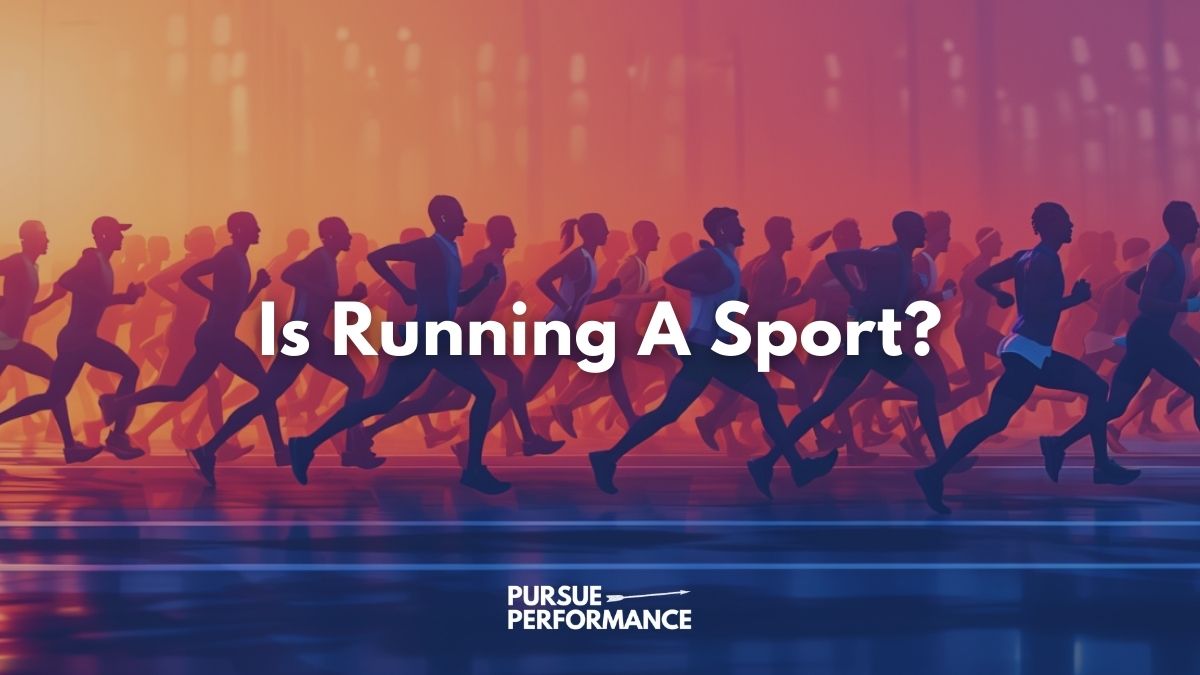The best answer to the question “Is running a sport?” is yes.
Running is an activity enjoyed by millions worldwide, both recreationally and competitively.
But there is some debate around whether running qualifies as a “sport” by definition.
In this post, we will share the definition of a sport, fully analyze running to determine if it is a sport, and explain what makes a sport and hobby different.
Let’s get started!
Key Takeaway:
Yes, competitive running is a sport because it requires advanced athletic skills, strategic planning, specialized training, and mastery of physical prowess in order to win races through direct head-to-head competition. Recreational jogging does not meet the full criteria qualifying running as a sport.
Is Running A Sport Overview
| Sport Criteria | Competitive Running | Recreational Running | Running (Overall) |
|---|---|---|---|
| Athletic skill development | ✅ | ✅ | ✅ |
| Mastery of physical prowess | ✅ | ✅ | ✅ |
| Frequent head-to-head competition | ✅ | ❌ | ✅ |
| Conditioning on par with major sports | ✅ | ❌ | ❌ |
| Skill optimization over years | ✅ | ❌ | ✅ |
| Battle competitors in real time | ✅ | ❌ | ✅ |
| Train year-round at high volumes | ✅ | ❌ | ❌ |
| Primary purpose is to win through performance | ✅ | ❌ | ❌ |
| Requires focus and dedication | ✅ | ✅ | ✅ |
| Metrics to benchmark performance | ✅ | ✅ | ✅ |
| Specialized equipment and apparel | ✅ | ✅ | ✅ |
Looking at overall running incorporating both competitive and casual styles, running is a mixed bag when judging against key sports criteria.
In terms of skill development, prowess mastery, competition frequency, benchmarks, equipment, and dedication – overall running measures up well as a sport.
But judged by performance conditioning, year-round training volumes, or primary purpose of winning through optimized performance – mass-participation running is less like major pro sports.
Running engenders competition, but not evenly across all its participants.
The competition niche stands apart from more recreational jogging for general athletic activity and health.
There are more reasons to count running as a sport than reasons against it.
Is Running A Sport Under Common Definitions

Sports are generally defined as athletic activities involving skill and physical prowess, where participants compete against others to win.
Running hits some, but not all, aspects of a classic sport definition:
Running Requires Some Athletic Skill
Proper running form and pacing require athletic skill and practice.
Maintaining an efficient stride, posture, arm carriage, and leg turnover necessitates drilling the biomechanics.
Any runner training for competition will spend hours honing running efficiency.
However, compared to sports like football or basketball, the overall skill threshold is lower in running.
Sports involving balls, teammates, and complex plays require coordinating more moving pieces.
Running is a simpler motion.
Running Demands Physical Prowess

There’s no doubt running tests key physical abilities like endurance, speed, leg strength, and overall conditioning.
Running a 5K hard or sprint intervals requires extreme fitness.
However, running involves less direct competition with others based purely on physical abilities.
Runners often don’t pit their physical prowess directly against competitors in real-time.
Races are more isolated time trials testing fitness.
Some Competitive Running Features Head-to-Head Competition

Major running event races like marathons and track meets have head-to-head competition to post the fastest time.
However, recreational running and training lack this direct competition.
Outside of races, runners are just aiming to beat their personal bests or achieve fitness goals.
The day-to-day training required for running success involves solo miles.
So head-to-head competition is occasional, not constant.
So by traditional definitions of sports requiring a confluence of athletic skills, physical mastery, and direct competition, running falls somewhat short.
The skills are moderate, prowess is indirect, and competition is periodic.
But in the context of races, running clearly attains sport status.
Judging Running As a Competitive Sport

Looking specifically at competitive running, there is a stronger case to classify it as a sport:
Professional Runners Are Elite Athletes
Professional track and marathon runners are some of the fittest, most conditioned athletes in the world.
For example, Olympic sprinters and marathoners train year-round, honing running-specific strength, stamina, speed, and skill.
They carefully tailor nutrition, rest, and recovery to sustain high mileage and fast intervals.
The conditioning required for competitive running is on par with any pro sport.
Running Competitions Involve Head-to-Head Battles

Major running competitions like world championship track meets or big city marathons feature direct head-to-head competition to win races across sprinting and endurance distances.
Elites fight each other in real-time to cross the finish line first or hit certain benchmarks.
Races require strategizing to leverage strengths and opponents’ weaknesses.
These head-to-head battles for supremacy are the pinnacle of competitive spirit.
Competitive Runners Hone Strategy And Skill
Elite runners focus intently on honing biomechanics, economy of motion, race tactics, and other skills to gain an edge.
Small optimizations in pacing, hill climbing technique, or optimizing cadence add up.
Like great boxers strategize for fights, pro runners meticulously prepare through training phases targeting peak performance.
Every skill and strategy edge counts when milliseconds separate winners.
| Factor | Competitive Running | Casual Running |
|---|---|---|
| Purpose | Win races against competitors by optimizing performance | General health and fitness |
| Commitment | 40-100+ miles per week with intense speedwork | 1-5 miles days per week |
| Skill Development | Refining running economy, biomechanics, race tactics over years | Basic running form |
| Athletic Attributes | World-class speed, endurance, strength | Modest fitness |
| Competitiveness | Fiercely head-to-head | For personal achievement |
So at the highest competitive level, running clearly attains “sport” status on par with other pro sports by requiring world-class athletic prowess, skills, and direct competition.
The line blurs more towards casual running simply for fitness and recreation.
Running As Athletic Activity vs Competitive Sport
In the end, rather than boxing running into a single definition, it may be most accurate to consider running both an “athletic activity” and a competitive “sport,” depending on context.
Casual jogging for fitness by amateurs doesn’t demand the same level of skill and competitiveness as needed to consider a leisurely activity a sport.
But competitive racing between specialized runners at higher intensities and skill levels better fulfills the criteria.
In the right context, running expresses the same trials of athleticism and competitive spirit as any modern sport.
Frequently Asked Questions
Is running an Olympic sport?
Yes, various running competitions like sprints, middle-distance events, cross-country running, relays, hurdles, steeplechase, and marathon are all recognized Olympic sports contested at the summer games. Competitive running made its first appearance at the founding Olympic games in 1896.
How many sports define running as fundamental?
Dozens of major sports like soccer, basketball, football, tennis, hockey, and more define speed and endurance running as fundamental skills to the game. Running is integral to most sports training and competitive play. Even sports like golf rely heavily on cardiovascular conditioning.
Do professional and college runners consider themselves athletes?
Yes, professional runners competing in lucrative road races and track/field events along with college track athletes on scholarships consider themselves full-time specialized athletes. They commit the same vigorous training, competitive drive, and lifestyle structure as other pro or elite amateur athletes to make running a job and source of income or education funding.
Is marathon running more a competition with others or yourself?
For amateur marathoners, focus tends towards an internal competition against one’s own capabilities and the clock more than direct rivalries. But elites fiercely compete head-to-head for not just the win, but purse money and sponsor incentives. Position battles add drama late into races. So marathon competition involves a balance of both time trial and rivalries.
What physical attributes make running a sport and not just exercise?
While running serves as basic cardio exercise, the extreme demands competitive running makes on VO2 max, lactic threshold, biomechanical economy and running-specific strength elevate the physical skills and attributes to advanced athletic territory most could never attain through general training. The body adapts in extraordinary ways.
Do runners require coaching and strategic planning?
Yes, even amateur runners aim to structure periodized training plans targeting race goals and peak performance timed to key events. And all professional runners require high-level positional coaches directing training phases and designing sessions to hone physiological abilities while avoiding injuries – along with strategizing pacing, mental approaches, and race tactics.
Where does running fall under sports classification systems?
Running events would categorize under athletics in a broader sport classification. But many sub-classify running by style or distance into track & field (sprints, Olympic distances), cross country running, or road racing (long distances, marathons). Racewalking is a unique form of foot racing warranting standalone categorization as well.








